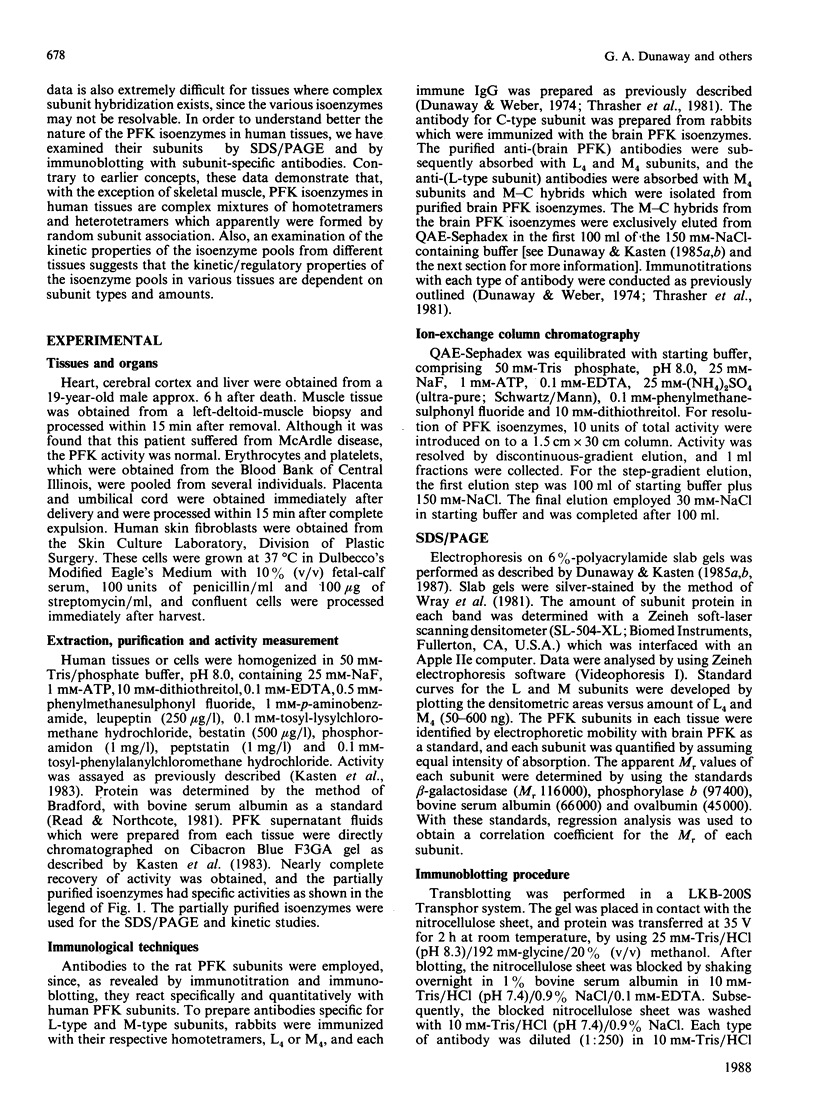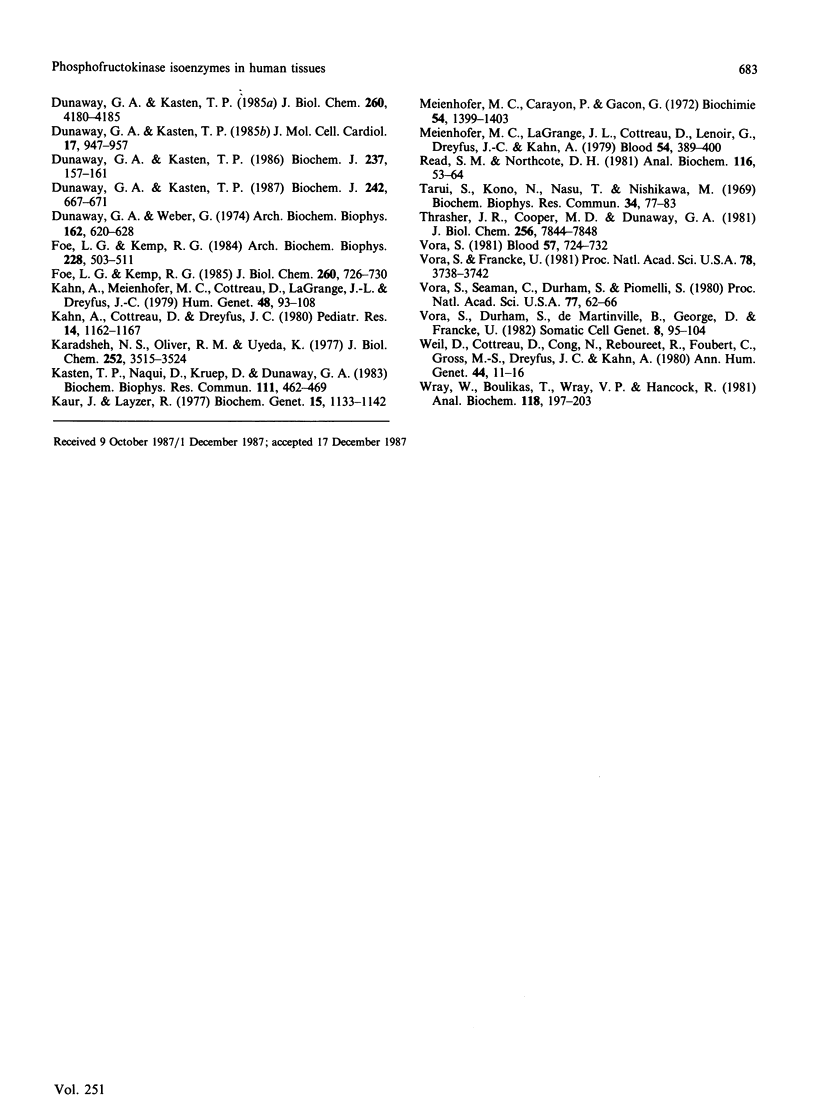Abstract
The 6-phosphofructo-1-kinase (PFK) subunits and isoenzymes were studied in human muscle, heart, brain, liver, platelets, fibroblasts, erythrocytes, placenta and umbilical cord. In each tissue, the subunit types in the native isoenzymes were characterized by immunological titration with subunit-specific antibodies and by column chromatography on QAE (quaternary aminoethyl)-Sephadex. Further, the subunits of the partially purified native isoenzymes were resolved by SDS/polyacrylamide-gel electrophoresis, identified by immunoblotting, and quantified by scanning gel densitometry of silver-stained gels and immunoblots. Depending on the type of tissue, one to three subunits were detected. The Mr values of the L, M and C subunits regardless of tissue were 76,700 +/- 1400, 82,500 +/- 1640 and 86,500 +/- 1620. Of the tissues studied, only the muscle PFK isoenzymes exhibited one subunit, which was the M-type subunit. Of the other tissues studied, the PFK isoenzymes contained various amounts of all three subunits. Considering the properties of the native PFK isoenzymes, it is clear that, in human tissues, they are not simply various combinations of two or three homotetrameric isoenzymes, but complex mixtures of homotetramers and heterotetramers. The kinetic/regulatory properties of the various isoenzyme pools were found to be dependent on subunit composition.
Full text
PDF






Images in this article
Selected References
These references are in PubMed. This may not be the complete list of references from this article.
- Cottreau D., Levin M. J., Kahn A. Purification and partial characterization of different forms of phosphofructokinase in man. Biochim Biophys Acta. 1979 May 10;568(1):183–194. doi: 10.1016/0005-2744(79)90285-7. [DOI] [PubMed] [Google Scholar]
- Davidson M., Collins M., Byrne J., Vora S. Alterations in phosphofructokinase isoenzymes during early human development. Establishment of adult organ-specific patterns. Biochem J. 1983 Sep 15;214(3):703–710. doi: 10.1042/bj2140703. [DOI] [PMC free article] [PubMed] [Google Scholar]
- Dunaway G. A. A review of animal phosphofructokinase isozymes with an emphasis on their physiological role. Mol Cell Biochem. 1983;52(1):75–91. doi: 10.1007/BF00230589. [DOI] [PubMed] [Google Scholar]
- Dunaway G. A., Jr, Weber G. Rat liver phosphofructokinase isozymes. Arch Biochem Biophys. 1974 Jun;162(2):620–628. doi: 10.1016/0003-9861(74)90224-0. [DOI] [PubMed] [Google Scholar]
- Dunaway G. A., Kasten T. P. Characterization of the rat heart 6-phosphofructo-1-kinase isozymes. J Mol Cell Cardiol. 1985 Oct;17(10):947–957. doi: 10.1016/s0022-2828(85)80075-4. [DOI] [PubMed] [Google Scholar]
- Dunaway G. A., Kasten T. P. Nature of the rat brain 6-phosphofructo-1-kinase isozymes. J Biol Chem. 1985 Apr 10;260(7):4180–4185. [PubMed] [Google Scholar]
- Dunaway G. A., Kasten T. P. Nature of the subunits of the 6-phosphofructo-1-kinase isoenzymes from rat tissues. Biochem J. 1987 Mar 15;242(3):667–671. doi: 10.1042/bj2420667. [DOI] [PMC free article] [PubMed] [Google Scholar]
- Dunaway G. A., Kasten T. Are the rat tissue/organ proportions of 6-phosphofructo-1-kinase subunits strain-specific? Biochem J. 1986 Jul 1;237(1):157–161. doi: 10.1042/bj2370157. [DOI] [PMC free article] [PubMed] [Google Scholar]
- Foe L. G., Kemp R. G. Isolation and characterization of phosphofructokinase C from rabbit brain. J Biol Chem. 1985 Jan 25;260(2):726–730. [PubMed] [Google Scholar]
- Foe L. G., Kemp R. G. Isozyme composition and phosphorylation of brain phosphofructokinase. Arch Biochem Biophys. 1984 Feb 1;228(2):503–511. doi: 10.1016/0003-9861(84)90016-x. [DOI] [PubMed] [Google Scholar]
- Kahn A., Cottreau D., Dreyfus J. C. Phosphofructokinase in human fetus. Pediatr Res. 1980 Nov;14(11):1162–1167. doi: 10.1203/00006450-198011000-00003. [DOI] [PubMed] [Google Scholar]
- Kahn A., Meienhofer M. C., Cottreau D., Lagrange J. L., Dreyfus J. C. Phosphofructokinase (PFK) isozymes in man. I. Studies of adult human tissues. Hum Genet. 1979 Apr 17;48(1):93–108. doi: 10.1007/BF00273280. [DOI] [PubMed] [Google Scholar]
- Karadsheh N. S., Uyeda K., Oliver R. M. Studies on structure of human erythrocyte phosphofructokinase. J Biol Chem. 1977 May 25;252(10):3515–3524. [PubMed] [Google Scholar]
- Kasten T. P., Naqui D., Kruep D., Dunaway G. A. Purification of homogeneous rat phosphofructokinase isozymes with high specific activities. Biochem Biophys Res Commun. 1983 Mar 16;111(2):462–469. doi: 10.1016/0006-291x(83)90329-7. [DOI] [PubMed] [Google Scholar]
- Kaur J., Layzer R. B. Nonidentical subunits of human erythrocyte phosphofructokinase. Biochem Genet. 1977 Dec;15(11-12):1133–1142. doi: 10.1007/BF00484503. [DOI] [PubMed] [Google Scholar]
- Meienhofer M. C., Carayon P., Gacon G. Les isozymes de la phosphofructokinase humaine. Biochimie. 1972;54(11):1399–1403. [PubMed] [Google Scholar]
- Meienhofer M. C., Lagrange J. L., Cottreau D., Lenoir G., Dreyfus J. C., Kahn A. Phosphofructokinase in human blood cells. Blood. 1979 Aug;54(2):389–400. [PubMed] [Google Scholar]
- Read S. M., Northcote D. H. Minimization of variation in the response to different proteins of the Coomassie blue G dye-binding assay for protein. Anal Biochem. 1981 Sep 1;116(1):53–64. doi: 10.1016/0003-2697(81)90321-3. [DOI] [PubMed] [Google Scholar]
- Tarui S., Kono N., Nasu T., Nishikawa M. Enzymatic basis for the coexistence of myopathy and hemolytic disease in inherited muscle phosphofructokinase deficiency. Biochem Biophys Res Commun. 1969 Jan 6;34(1):77–83. doi: 10.1016/0006-291x(69)90531-2. [DOI] [PubMed] [Google Scholar]
- Thrasher J. R., Cooper M. D., Dunaway G. A. Developmental changes in heart and muscle phosphofructokinase isozymes. J Biol Chem. 1981 Aug 10;256(15):7844–7848. [PubMed] [Google Scholar]
- Vora S., Durham S., de Martinville B., George D. L., Francke U. Assignment of the human gene for muscle-type phosphofructokinase (PFKM) to chromosome 1 (region cen leads to q32) using somatic cell hybrids and monoclonal anti-M antibody. Somatic Cell Genet. 1982 Jan;8(1):95–104. doi: 10.1007/BF01538653. [DOI] [PubMed] [Google Scholar]
- Vora S., Francke U. Assignment of the human gene for liver-type 6-phosphofructokinase isozyme (PFKL) to chromosome 21 by using somatic cell hybrids and monoclonal anti-L antibody. Proc Natl Acad Sci U S A. 1981 Jun;78(6):3738–3742. doi: 10.1073/pnas.78.6.3738. [DOI] [PMC free article] [PubMed] [Google Scholar]
- Vora S. Isozymes of human phosphofructokinase in blood cells and cultured cell lines: molecular and genetic evidence for a trigenic system. Blood. 1981 Apr;57(4):724–732. [PubMed] [Google Scholar]
- Vora S., Seaman C., Durham S., Piomelli S. Isozymes of human phosphofructokinase: identification and subunit structural characterization of a new system. Proc Natl Acad Sci U S A. 1980 Jan;77(1):62–66. doi: 10.1073/pnas.77.1.62. [DOI] [PMC free article] [PubMed] [Google Scholar]
- Weil D., Cottreau D., Nguyen Van Cong, Rebourcet R., Foubert C., Gross M. S., Dreyfus J. C., Kahn A. Assignment of the gene for F-type phosphofructokinase to human chromosome 10 by somatic cell hybridization and specific immunoprecipitation. Ann Hum Genet. 1980 Jul;44(Pt 1):11–16. doi: 10.1111/j.1469-1809.1980.tb00941.x. [DOI] [PubMed] [Google Scholar]
- Wray W., Boulikas T., Wray V. P., Hancock R. Silver staining of proteins in polyacrylamide gels. Anal Biochem. 1981 Nov 15;118(1):197–203. doi: 10.1016/0003-2697(81)90179-2. [DOI] [PubMed] [Google Scholar]



